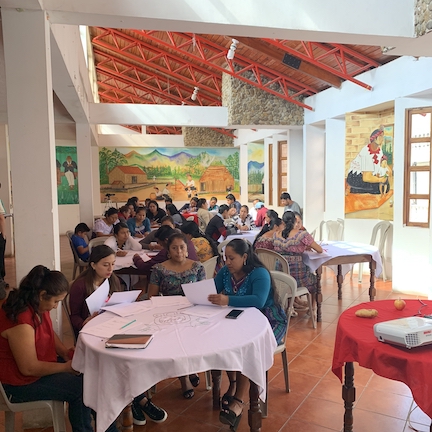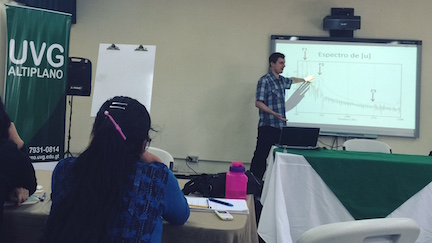The Uspanteko Phonetics and Prosodic Phonology Project (UPPPP!)
The UPPPP! project is focused on documenting and describing the phonetics and phonology of the Mayan language Uspanteko, as well as developing corpora and computational resources to further this task. This work is funded by the National Science Foundation (BCS/DEL-1551043/1551666).
Xoqoneb'
We are beginning to edit and post glossed Uspanteko texts for easy perusing outside the AILLA archive. Check out our first, entitled Xoqoneb', which tells of an encounter between an Uspanteko man and the supernatural lord of the hill Xoqoneb'. For more information on this story, check out an accompanying academic journal article we are prepping for publication. Keep an eye out on our Resources page for more.
Documenting the Value of DEL
The UPPPP! project was recently highlighted in a National Science Foundation video illustrating the value of the Documenting Endangered languages program. You can check out that video here.
ICPhS 2019
Team Tz'únun was in Australia in August 2019 for the International Congress of Phonetic Sciences, a premier conference in phonetics held every four years with participants from all over the world. We presented two papers that made cricial use of our work on Uspanteko: "The interaction of tone and intonation in Uspanteko" and "Unite and conquer: Bootstrapping forced alignment tools for closely-related minority languages (Mayan)." Be sure to check them out on the publications page.
CLU Workshop on Total Physical Response
Robert, Ryan, and Meg organized and taught a two-day workshop at the Comunidad Lingüística Uspanteka in San Miguel Uspantán. The focus of the workshop was using Total Physical Response (TPR) for teaching indigenous languages. On the first day of the workshop, participating bilingual educators learned the theory behind TPR. On day two, those participants split into small groups, worked out a lesson plan, and then taught the rest of the attendees. Nearly 40 bilingual educators who teach in Uspanteko and K'iche' participated in the event. Be on the lookout for future papers and presentations based on this work.

Explorations in electroglottography
In the summer of 2019, the Uspanteko team began a new set of experiments to study syncope. In particular, we are interested in whether vowels that undergo syncope are completely unrealized or merely reduced. To do this, we are using electroglottography to measure the physical activity of the vocal folds during words that contains vowels that undergo syncope.

CLU Workshop on ELAN
Robert and Ryan, in concert with graduate research assistant Meg Harvey, organized a two day workshop on the linguistic annotation software platform ELAN at the Comunidad Lingüística Uspanteka in San Miguel Uspantán. Attendees were introduced to the basics of ELAN, as well as how to produce materials for the broader community from annotated ELAN files. Over the course of the workshop, attendees worked in teams to produce small subtitled videos, which were shared on the final day. The workshop was attended by youth and adults from Uspantán, as well as the neighboring region of Alta Verapaz. There were speakers of Uspanteko, K'iche', and Poqomchi' in attendance.

UVG Workshop in Practical Phonetics
Robert and Ryan, in concert with Dr. Pedro Mateo Pedro, organized a three day workshop on practical phonetics at the Universidad del Valle de Guatemala, Campus Altiplano. Topics included basic acoustic phonetics, IPA, principles of recording, and an introduction to phonetics software (e.g. Praat). The workshop was well attended, with speakers of more than 5 different Mayan languages, including, of course, Uspanteko.

Recording in Uspantán
Ryan and Robert were in Uspantán in June / July 2016 to run the first in a set of experiments on the prosody of Uspanteko. The team was graciously hosted by the Comunidad Lingüística Uspanteka. Twenty-two speakers were recorded over two weeks from multiple Uspanteko-speaking communities in the area.
